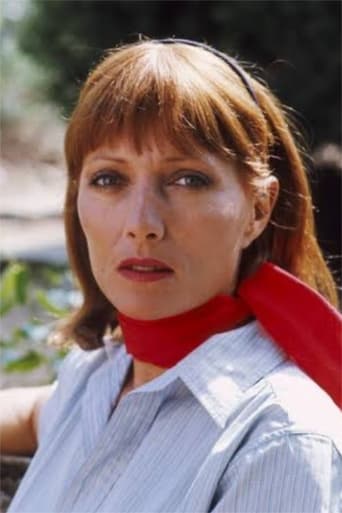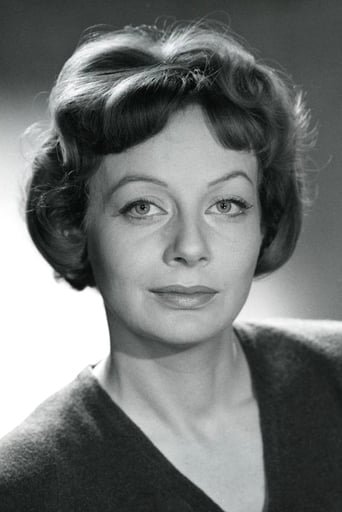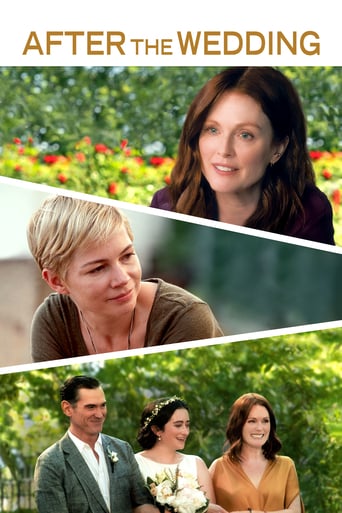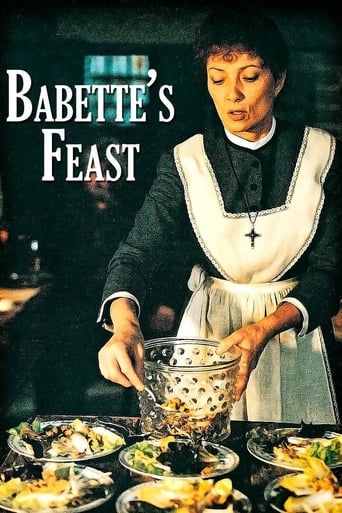
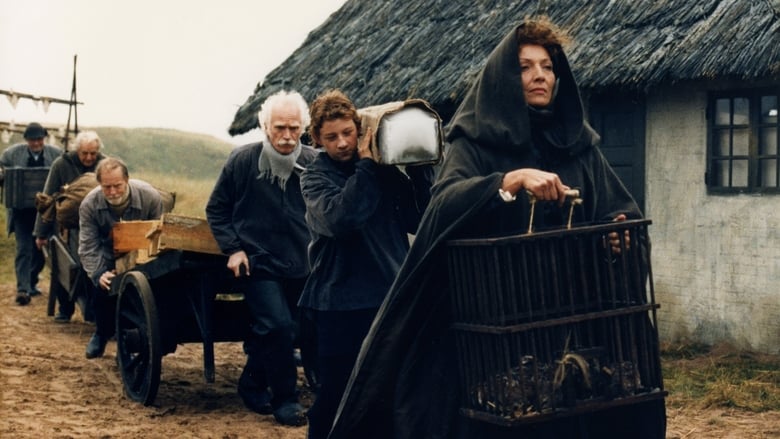
Babette's Feast (1988)
A French housekeeper with a mysterious past brings quiet revolution in the form of one exquisite meal to a circle of starkly pious villagers in late 19th century Denmark.
Watch Trailer
Cast
Similar titles
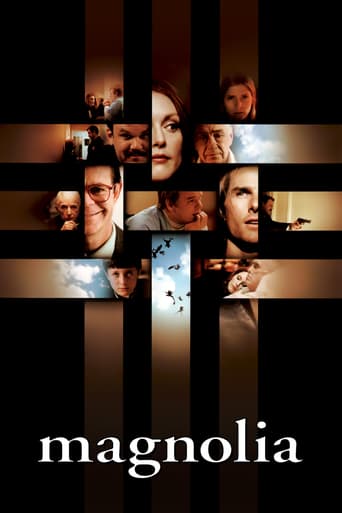




Reviews
Memorable, crazy movie
It's entirely possible that sending the audience out feeling lousy was intentional
This story has more twists and turns than a second-rate soap opera.
Like the great film, it's made with a great deal of visible affection both in front of and behind the camera.
Much like the delicacies that grace the table in this film, each scene of "Babette's Feast" seems a treat for the senses -- a joy to behold, against the hardscrabble backdrop of Jutland, Denmark. Whenever I am asked to name my favorite film, "Babette's Feast" jumps to mind. Babette is the ultimate role model -- a woman who survives the worst of life only to rebound with strength and vibrancy. I have seen this dazzling movie several times over the years, and in the past I focused on the meal's magical impact on guests at the feast. This time around I found Babette and Achille Papin most compelling."An artist is never poor," Babette reminds us. And aren't we all, potentially, artists? Quoting the French baritone Achille (played exquisitely by Jean-Phillipe LaFont): "One long cry from the heart of the artist -- Give me leave to do my utmost!" Mirroring the bedecked table, the casting here approaches perfection. Stephane Audrane was born to play a French refugee in a small Danish village, bantering with the locals to get a better price on fish. Bodil Kjer and Brigitte Federspiel shine as a pair of religious sisters -- but, for God's sake, why couldn't Lorens's intended utter even a word to the smitten man? And Jarl Kulle fascinates as a worldly general whose military regalia belies a poetic soul. "He visited many times but it seemed to him he grew more insignificant each time." (Wow, does that line nail one of life's sadder experiences!) And later, this sensitive man confides, "...I have learned in life there are some things that are impossible..."I will never forget this film, and if I somehow become stranded on a desert island, this is the only movie I'd ever require. Babette, thank you for your example!
This may be one of my top ten films; at least it's close. I think the beauty of it is that the setup is so low key; the events so inconsequential. Yet those events leading to the final feast are so incredibly well introduced and the characters so incredibly interesting. It also gives us that theme of redemption. This is a chance for a person who has gone through life unnoticed to push her gifts to the maximum and have that one great moment. We get to watch as things unfold. We get to absorb the history that leads to this moment. Of course, without wonderful performances it wouldn't work. When it's over, we feel fulfilled. The world isn't much different than when we entered; but then we all are here for a short time. The mark of a good movie for me is that I occasionally think back on scenes and events long after seeing the film. This is one of them. It's more than worth every moment.
Featuring in the book 1001 Movies You Must See Before You Die, I knew it was a Danish film I was going to watch no matter what, and it did sound really appealing as I found out more about it. Basically, set in the 19th Century, Denmark, adult sisters Martine (Birgitte Federspiel) and Philippa (Bodil Kjer) are spinsters living with their father, the founder of a strict Christian sect, in an isolated village. They have the opportunity in moments to leave the village and find another good life, but they stay loyal to their father, serving him in his church. Soon enough French refugee Babette Hersant (BAFTA nominated Stéphane Audran) comes knocking at their door begging them to let her stay with them, and serving as their maid, housekeeper and cook to earn her keep. The sisters' father has been dead for some time, and they decide to commemorate the one hundredth year of his birth, and this will see a group of friends invited for dinner, and this gives Babette a great opportunity to prove herself. She implores them to let her prepare the meal that they will eat at this celebration, and they do agree, but secretly they have their concerns for what food she will be serving them, and seeing the preparations of the food worries them as well, such as dead animals being used. They also worry because she is a foreigner that will have different tastes, and while they are Christian she is Catholic, but they let her carry on. It comes to the evening of the feast, and the guests attending are the members of the small church and important gentlemen, including General Lorens Löwenhielm (Jarl Kulle), and they are also relatively unsure what they will think of the food on offer. Babette serves them turtle soup with amontillado (sherry), buckwheat cakes with caviar and sour cream, quail in puff pastry shell with foie gras and truffle sauce, a salad featuring Belgian chicory and walnuts in a vinaigrette, "Les Fromages" featuring blue cheese, papaya, figs, grapes, pineapple, and pomegranate, and rum sponge cake with figs and glacéed fruits, with numerous rare wines. The feast is a tremendous success, and it is only afterwards that Babette reveals that she was in fact the famous former Chef of the Café Anglais, but she presumably stays with the sisters instead of returning to Paris. Also starring Jean-Philippe Lafont as Achille Papin, Gudmar Wivesson as Young Lorens Löwenhielm, Bibi Andersson as Svensk Hofdame, Hanne Stensgaard as Young Filippa and Vibeke Hastrup as Young Martine. The acting is relatively good, and it is an interesting enough story, but I will be honest, the best scenes are of course that the feast, the preparations are good viewing, and the guests enjoying the food served makes for a nice result, as it changes all their lives or whatever, all in all it is an entertaining period drama. It won the Oscar for Best Foreign Language Film, it won the BAFTA for Best Film not in the English Language, and it was nominated for Best Cinematography, Best Direction for Gabriel Axel, Best Adapted Screenplay and Best Film, and it was nominated the Golden Globe for Best Foreign Language Film. Very good!
Lovely, literate, gentle film-making. A tale of passions and art thwarted and brought to life, with lovely photography, and solid performances. The charming story of two spinster sisters in a dour, religious Danish town who take in a French political refugee. After years of working for these women, with gratitude and gentleness, but little expressed emotion, the woman (Stephane Audran) uses lottery money she wins not to return to France, or to start her own life, but to create a feast, bringing back her own lost artistry as one of France's great chefs. In spite of their promise not to get swept up in the food, the locals slowly succumb to it's sublime mix of the sacred and the sensual. All of this is sweet, interesting, entertaining and well told, but for me there's also something a tiny bit thin about it. It feels like a short story stretched to feature length (which it is), and I didn't find it quite as moving emotionally as I wished. Many like it more than me, but to me it's a lovely, well-told, worthwhile film, but not quite a great one.
